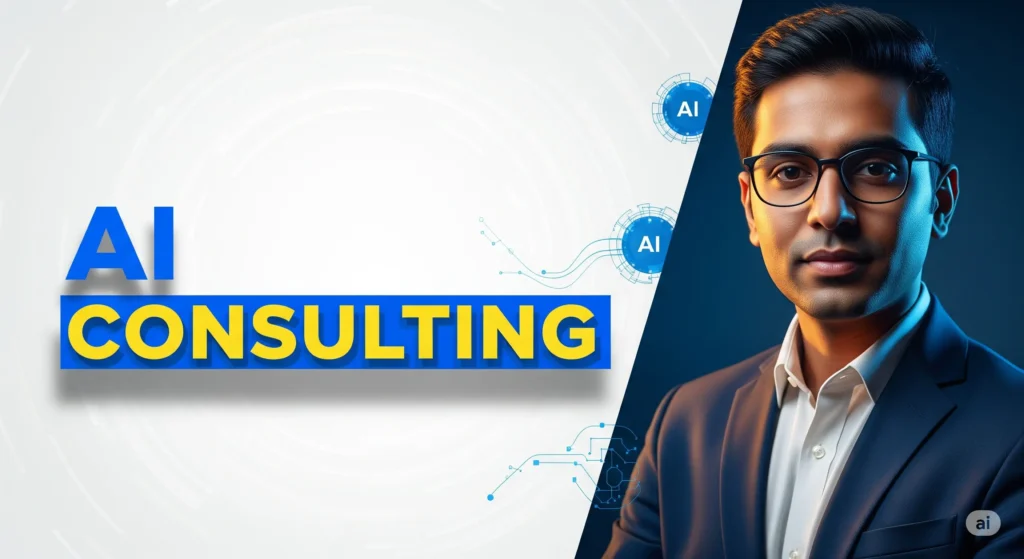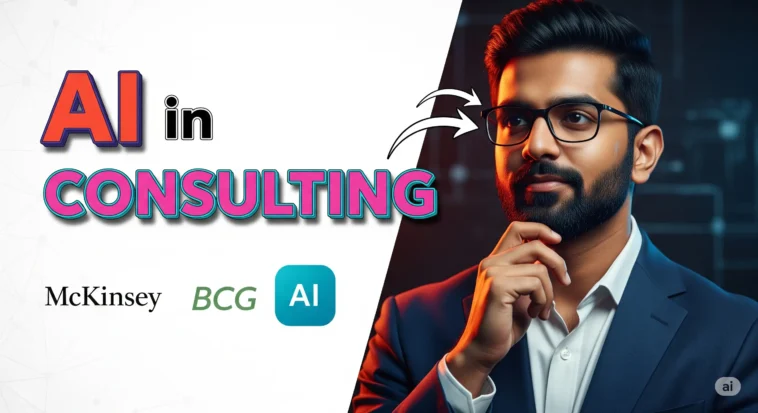AI in Consulting: Lessons from McKinsey & BCG’s AI Initiatives
The landscape of modern business is rapidly evolving, with Artificial Intelligence (AI) at the forefront of this seismic shift. For those navigating the complexities of strategic decision-making, from MBA students charting their careers to entrepreneurs building the next big thing, understanding the practical application of AI is paramount. Nowhere is this more evident than in the elite echelons of management consulting. Firms like McKinsey & Company and Boston Consulting Group (BCG) aren’t just advising clients on AI strategy; they are actively integrating and leveraging AI within their own operations, reshaping their service offerings, and redefining the very future of consulting.
This comprehensive guide dives deep into the AI initiatives of these industry titans, exploring their distinct approaches, the groundbreaking solutions they’ve developed, and most importantly, the invaluable lessons that can be gleaned from their pioneering journeys. We’ll uncover how AI transformation consulting is creating new value, examine the impact of generative AI on consulting, and provide actionable insights for anyone looking to harness the power of AI in their own professional endeavors. Prepare to unlock strategic wisdom from the very firms setting the pace in AI adoption.

Image: AI reshaping the future of consulting.
The Rise of AI in Management Consulting
Management consulting has always been about bringing expert insights, data-driven analysis, and strategic solutions to complex business problems. Traditionally, this involved extensive manual data gathering, human analysis, and iterative problem-solving. However, the sheer volume and velocity of data available today, coupled with the emergence of sophisticated AI technologies like machine learning in business and natural language processing (NLP) consulting, have necessitated a profound shift.
AI is no longer just a buzzword; it’s a critical enabler for consultants to deliver deeper insights, achieve greater operational efficiency, and provide more personalized client solutions. From automating routine tasks in consulting workflows to powering advanced predictive analytics, AI is fundamentally altering how consulting firms operate and the value they can offer. The firms that embraced this early, like McKinsey and BCG, have solidified their positions as leaders in AI strategy consulting, demonstrating how AI can be a powerful strategic differentiator.
McKinsey’s AI Strategy & Initiatives: QuantumBlack and Beyond
McKinsey & Company, a global leader in management consulting, has made substantial investments in AI, particularly through its acquisition and development of QuantumBlack, AI by McKinsey. This dedicated AI arm serves as the nucleus for McKinsey’s AI initiatives, bringing together data scientists, engineers, and designers to build proprietary AI tools and solutions for clients.
Leveraging Data Science for Client Impact
McKinsey’s approach heavily emphasizes leveraging data science consulting to unlock value. QuantumBlack focuses on applying advanced analytics and AI to real-world business challenges, from optimizing supply chains to personalizing customer experiences. They often work with large, complex datasets, identifying patterns and generating actionable insights that traditional methods might miss. This allows McKinsey consultants to advise clients not just on strategy, but on tangible, data-driven transformation.
McKinsey’s Approach to AI-Driven Operational Efficiency
Beyond client solutions, McKinsey has also integrated AI to enhance its own internal operations and project delivery. AI-driven operational efficiency consulting helps automate aspects of market research and due diligence with AI, streamline data analysis, and even assist in generating initial drafts of reports. This allows consultants to dedicate more time to high-value strategic thinking, client interaction, and complex problem-solving, rather than repetitive tasks.
Developing AI Talent within McKinsey
A crucial part of McKinsey’s AI strategy involves cultivating deep AI talent within the firm. They actively recruit top AI and data science professionals, and invest heavily in reskilling their existing consultant workforce. This commitment ensures that their teams possess both strategic business acumen and the technical proficiency required to implement cutting-edge AI solutions. McKinsey QuantumBlack AI insights are a testament to this integrated approach.
Suggested Internal Link: Read about the Future of Work: How AI is Reshaping Industries
BCG’s AI Leadership: Innovations from BCG Gamma
Boston Consulting Group (BCG) has similarly positioned itself as a vanguard in AI, primarily through its specialized unit, BCG Gamma. Launched in 2017, BCG Gamma focuses on advanced analytics, data science, and proprietary AI tools, aiming to deliver breakthrough solutions for complex client challenges. BCG’s AI solutions are known for their blend of analytical rigor and practical business application.
BCG Gamma’s Role in Advanced Analytics
BCG Gamma excels at applying sophisticated analytical models and AI algorithms to tackle issues ranging from customer segmentation and pricing optimization to risk management and organizational change management. Their multidisciplinary teams combine deep industry expertise with cutting-edge data science, translating complex data into clear, strategic recommendations. This holistic BCG Gamma AI consulting approach emphasizes not just building models, but ensuring they deliver measurable business impact.
Proprietary AI Tools and Methodologies at BCG
BCG has invested significantly in developing proprietary AI tools and AI adoption frameworks designed for specific industry challenges. These tools often integrate machine learning, deep learning applications, and generative AI for strategy, allowing consultants to rapidly analyze vast datasets and simulate complex scenarios. This commitment to unique methodologies helps distinguish BCG’s AI offerings and accelerates value creation for their clients.
Client Co-creation and AI Solutions
A hallmark of BCG’s approach is strong client co-creation. They often embed their AI experts within client teams, fostering knowledge transfer and ensuring solutions are tailored and sustainable. This collaborative model helps clients build their own internal AI capabilities, addressing the challenge of upskilling clients for AI adoption. This commitment makes BCG’s AI solutions impactful and lasting.
Suggested External Link: Explore BCG Gamma’s official insights on AI & Analytics.
Key Areas Where AI is Transforming Consulting
The impact of AI on consulting is multifaceted, fundamentally altering how firms operate and the value they deliver. AI transformation consulting is not just about automation; it’s about augmentation, enabling consultants to be more effective, strategic, and impactful.

Enhancing Market Research and Due Diligence with AI
AI tools can rapidly sift through enormous volumes of market data, news articles, financial reports, and social media feeds, identifying trends, competitive landscapes, and emerging risks far faster than human teams. This enhances market research and due diligence with AI, providing consultants with a superior informational foundation for strategic advisory.
AI for Predictive Modeling and Forecasting
From predicting market shifts and consumer behavior to forecasting financial performance and supply chain disruptions, AI-driven predictive analytics is a game-changer. Consulting firms use AI for predictive analytics to build more accurate models, enabling clients to make proactive, data-driven decisions and better navigate uncertainty.
Automating Routine Tasks in Consulting Workflows
Tasks like data aggregation, report generation, literature reviews, and even scheduling can be significantly automated using AI and automation in business processes. This frees up consultants from mundane, time-consuming activities, allowing them to focus on complex analysis, client relationships, and creative problem-solving.
Personalized Client Solutions with AI
By analyzing client-specific data, AI can help tailor strategies and recommendations to an unprecedented degree. Whether it’s optimizing marketing campaigns for a specific demographic or designing bespoke operational improvements, AI enables consultants to deliver highly personalized solutions that drive maximum impact and support business model innovation.
Lessons Learned from AI Adoption by Top Firms
The pioneering journeys of McKinsey and BCG in AI provide invaluable blueprints for any organization or individual aspiring to leverage this transformative technology. What lessons can be learned from big consulting AI projects?
The Importance of Data Infrastructure
Both firms emphasize that robust data infrastructure is the bedrock of successful AI. Without clean, accessible, and integrated data, even the most advanced AI models are ineffective. Investing in data governance, data pipelines, and cloud capabilities is a non-negotiable first step for effective AI adoption frameworks.
Integrating AI into Core Consulting Processes
AI isn’t a standalone department; it’s seamlessly woven into the fabric of daily consulting work. From initial client engagement to final solution delivery, AI augments human capabilities. This requires a shift in mindset and a willingness to rethink traditional consulting methodologies, moving towards an AI-driven decision making culture.
Cultivating an AI-First Mindset
True AI transformation goes beyond tools and technology; it requires a cultural shift. Top firms actively cultivate an “AI-first” mindset, encouraging consultants to identify AI opportunities, understand its implications, and challenge traditional approaches. This fostering of AI literacy is critical for navigating the consulting industry AI adoption trends.
Navigating the AI Talent Gap
Acquiring and retaining top AI talent is a continuous challenge. McKinsey and BCG address this through strategic recruitment, extensive training programs, and fostering an environment where AI professionals can thrive. For aspiring consultants, this highlights the growing demand for hybrid skill sets that combine business acumen with AI understanding.
Suggested Internal Link: Discover the Latest Trends in Data Science Consulting
Challenges and Ethical Considerations in AI Consulting
Despite the immense opportunities, the journey into AI consulting is not without its hurdles. Top firms are acutely aware of the complex challenges and ethical implications of AI in consulting that must be addressed.
Data Privacy and Security in AI Applications
Working with vast amounts of client data inherently raises concerns about privacy and security. Consulting firms must implement stringent data governance policies, comply with regulations like GDPR and CCPA, and invest in robust cybersecurity measures to protect sensitive information used in AI models.
Addressing AI Bias and Fairness
AI models are only as unbiased as the data they are trained on. Firms like McKinsey and BCG are actively working to identify and mitigate algorithmic bias, ensuring their AI solutions promote fairness and do not inadvertently perpetuate or amplify societal inequalities. This is a crucial aspect of responsible AI governance.
Reskilling the Consulting Workforce
The rapid evolution of AI means consultants need continuous learning and reskilling. While AI automates some tasks, it also creates new, more complex roles requiring different skill sets, such as AI strategists, prompt engineers, and data ethicists. This ongoing need for upskilling is a significant organizational challenge.
The Future Landscape: What’s Next for AI in Consulting?
The future of consulting AI is poised for even greater integration and innovation. We can expect AI to become even more pervasive, moving beyond discrete tools to form the backbone of entire consulting engagements.
Generative AI for Strategy: The rise of generative AI is a major disruptor. This technology will not only automate content creation for reports and presentations but also assist in brainstorming innovative solutions, simulating complex scenarios, and even crafting bespoke strategic recommendations at an unprecedented speed. It promises to transform client engagement strategies by creating highly personalized and dynamic advisory experiences.
Hyper-personalization: AI will enable consultants to deliver hyper-personalized solutions, not just to clients, but within client organizations. This means tailoring change management programs, training modules, and strategic interventions based on individual employee needs and departmental dynamics.
Ethical AI by Design: As AI becomes more powerful, the focus on ethical AI deployment will intensify. Future consulting engagements will increasingly demand AI solutions built with transparency, explainability, and fairness embedded from the ground up, rather than as an afterthought. This proactive approach will be a core competency for best practices AI consulting firms.
Suggested External Link: Explore more thought leadership on Artificial Intelligence from Harvard Business Review.
Actionable Insights for Businesses and Aspiring Consultants
The journeys of McKinsey and BCG offer invaluable lessons for anyone looking to navigate the AI-driven future.
Key Takeaways for AI Adoption:
- Invest in Data Foundation: Prioritize clean, accessible data. It’s the fuel for all AI initiatives.
- Integrate, Don’t Isolate: Embed AI capabilities into core processes, don’t treat it as a separate technology silo.
- Cultivate an AI-First Culture: Foster a mindset where AI is seen as an enabler and opportunity, not just a tool.
- Upskill Your Workforce: Proactively address the AI talent gap through continuous learning and strategic recruitment.
- Prioritize Ethical AI: Build trust by addressing data privacy, security, and bias from the outset.
- Embrace Generative AI: Explore how generative AI can augment creativity and efficiency in strategic planning and content generation.
For MBA students and aspiring consultants, understanding AI is no longer optional; it’s a critical differentiator. Focus on developing analytical skills, understanding AI maturity models, and cultivating a strategic mindset that can apply AI to complex business challenges. Entrepreneurs, meanwhile, should consider how AI can be a strategic differentiator for their own businesses, exploring AI as a competitive moat and building proprietary AI solutions where feasible.
Frequently Asked Questions About AI in Consulting
What is McKinsey’s AI strategy for clients?
McKinsey’s AI strategy primarily revolves around its QuantumBlack AI arm, focusing on leveraging advanced data science and proprietary AI tools to solve complex client problems, enhance operational efficiency, and drive AI-driven transformation across various industries. They emphasize delivering tangible, measurable impact through AI.
How is AI transforming management consulting?
AI is transforming management consulting by enhancing market research, enabling advanced predictive analytics, automating routine tasks, and facilitating highly personalized client solutions. It allows consultants to provide deeper insights, work more efficiently, and focus on higher-value strategic advisory.
Why are BCG’s AI solutions impactful?
BCG’s AI solutions, particularly through BCG Gamma, are impactful due to their blend of analytical rigor, deep industry expertise, proprietary AI tools, and a strong emphasis on client co-creation. They focus on practical application and embedding AI capabilities within client organizations for sustainable results.
What are the challenges of implementing AI in consulting?
Key challenges include ensuring robust data privacy and security, addressing potential AI bias and fairness issues in algorithms, navigating the AI talent gap within firms, and successfully integrating AI into existing core consulting processes and organizational cultures.
How do consulting firms use AI for predictive analytics?
Consulting firms use AI for predictive analytics to forecast market trends, consumer behavior, financial performance, and operational bottlenecks. By building sophisticated models, they help clients anticipate challenges, identify opportunities, and make more informed, proactive decisions.


